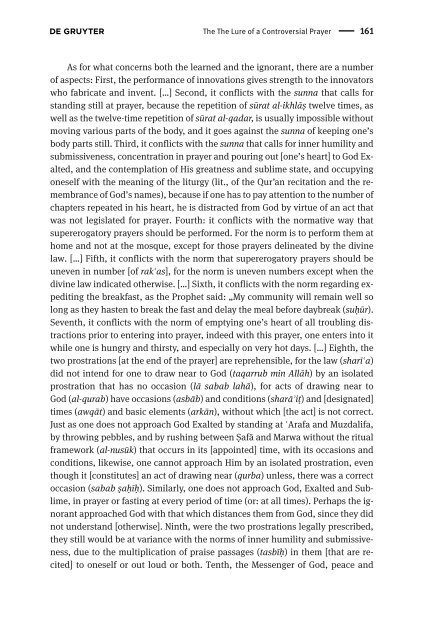0021-1818_islam_98-1-2-i-259
0021-1818_islam_98-1-2-i-259
0021-1818_islam_98-1-2-i-259
Create successful ePaper yourself
Turn your PDF publications into a flip-book with our unique Google optimized e-Paper software.
The The Lure of a Controversial Prayer 161<br />
As for what concerns both the learned and the ignorant, there are a number<br />
of aspects: First, the performance of innovations gives strength to the innovators<br />
who fabricate and invent. […] Second, it conflicts with the sunna that calls for<br />
standing still at prayer, because the repetition of surat al-ikhlas twelve times, as<br />
well as the twelve-time repetition of surat al-qadar, is usually impossible without<br />
moving various parts of the body, and it goes against the sunna of keeping one’s<br />
body parts still. Third, it conflicts with the sunna that calls for inner humility and<br />
submissiveness, concentration in prayer and pouring out [one’s heart] to God Exalted,<br />
and the contemplation of His greatness and sublime state, and occupying<br />
oneself with the meaning of the liturgy (lit., of the Qur’an recitation and the remembrance<br />
of God’s names), because if one has to pay attention to the number of<br />
chapters repeated in his heart, he is distracted from God by virtue of an act that<br />
was not legislated for prayer. Fourth: it conflicts with the normative way that<br />
supererogatory prayers should be performed. For the norm is to perform them at<br />
home and not at the mosque, except for those prayers delineated by the divine<br />
law. […] Fifth, it conflicts with the norm that supererogatory prayers should be<br />
uneven in number [of rak^as], for the norm is uneven numbers except when the<br />
divine law indicated otherwise. […] Sixth, it conflicts with the norm regarding expediting<br />
the breakfast, as the Prophet said: „My community will remain well so<br />
long as they hasten to break the fast and delay the meal before daybreak (suhur).<br />
Seventh, it conflicts with the norm of emptying one’s heart of all troubling distractions<br />
prior to entering into prayer, indeed with this prayer, one enters into it<br />
while one is hungry and thirsty, and especially on very hot days. […] Eighth, the<br />
two prostrations [at the end of the prayer] are reprehensible, for the law (shari^a)<br />
did not intend for one to draw near to God (taqarrub min Allah) by an isolated<br />
prostration that has no occasion (la sabab laha), for acts of drawing near to<br />
God (al-qurab) have occasions (asbab) and conditions (shara#it) and [designated]<br />
times (awqat) and basic elements (arkan), without which [the act] is not correct.<br />
Just as one does not approach God Exalted by standing at ^Arafa and Muzdalifa,<br />
by throwing pebbles, and by rushing between Safa and Marwa without the ritual<br />
framework (al-nusuk) that occurs in its [appointed] time, with its occasions and<br />
conditions, likewise, one cannot approach Him by an isolated prostration, even<br />
though it [constitutes] an act of drawing near (qurba) unless, there was a correct<br />
occasion (sabab sahih). Similarly, one does not approach God, Exalted and Sublime,<br />
in prayer or fasting at every period of time (or: at all times). Perhaps the ignorant<br />
approached God with that which distances them from God, since they did<br />
not understand [otherwise]. Ninth, were the two prostrations legally prescribed,<br />
they still would be at variance with the norms of inner humility and submissiveness,<br />
due to the multiplication of praise passages (tasbih) in them [that are recited]<br />
to oneself or out loud or both. Tenth, the Messenger of God, peace and


